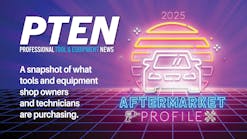Entry-level certification
Employers in every field face a perennial challenge: Evaluating and selecting new employees. Unfortunately, hiring managers often find there is not a shortage of applicants, but rather a shortage of qualified applicants.
Many auto repair shops use the National Institute for Automotive Service Excellence (ASE) certifications for hiring, promotion, and recognition of their experienced technicians. It only makes sense to look for similar credentials to qualify entry-level applicants.
ASE is here to help with its entry-level certification program for students who are near the end of their studies (in other words, future technicians about to begin their careers). By making solid entry-level hires, shop owners can avoid churn and feel confident their new technicians can grow with the company into full-fledged service professionals.
There are 19 entry-level tests total in the areas of automobile service, collision repair and refinishing, and medium/heavy truck repair. ASE developed the tests in partnership with the ASE Education Foundation and SkillsUSA. The tests in each series parallel the instructional standards of ASE accredited training programs. The entry-level automotive series consists of tests in the following core areas:
- Automatic Transmission/Transaxle
- Automobile Service Technology
- Brakes
- Electrical/Electronic Systems
- Engine Performance
- Engine Repair
- Heating and Air Conditioning
- Maintenance and Light Repair
- Manual Drive Train and Axles
- Suspension and Steering
ASE’s entry-level certification offers an independent assessment that is valuable for all stakeholders:
- Instructors and administrators, who are working to respond to today’s increasing demands for measurable outcomes and accountability.
- Students, who gain a respected credential and pride in accomplishment (along with their parents, who can rest easier knowing their children’s program of studies is subject to an independent evaluation through ASE program accreditation and exit testing of the students).
- Hiring managers, who can use ASE entry-level certification as a meaningful tool to evaluate potential service employees.
ASE entry-level certification can be thought of as the first step in what should be a career-long process of credentialing and professionalism:
- ASE entry-level certification
- ASE professional technician certification
- ASE master medium/heavy truck technician status
- ASE advanced-level specialist
A deeper look
Those who know ASE through its professional technician certification series know ASE does not dictate content areas and test questions. Its certification tests are developed in response to industry needs, with panels of industry experts, including working technicians, service managers, and trainers, developing the scope of ASE tests and writing test questions.
ASE uses the same approach for its entry-level certification program, but here the tests are tied to the school’s training program and curriculum. More specifically, the tests are built around the ASE Education Foundation’s program accreditation task lists (formerly NATEF Program Evaluation).
The tests are designed to maximize accuracy and meaningfulness. Test questions are developed in workshops and are validated through pretesting. Non-scored questions are included to measure potential test questions’ performance before they become “live” questions.
Behind the scenes, the process even incudes Item response theory statistical techniques in test development – esoteric to all except testing professionals, but an extra level of assurance to students, instructors, and hiring managers the tests are doing their job.
Unlike professional-level ASE certifications, there are no work experience requirements for ASE entry-level certifications. The student simply needs to pass one or more of the entry-level tests.
All high school and college level medium/heavy truck training programs nationwide may use the ASE entry-Level certification program, regardless of their accreditation status or involvement with ASE, the ASE Education Foundation, or SkillsUSA. The tests are available year-round.
All tests are administered at the school through secure computer-based testing delivered via the internet. A proctor, who is a staff person other than an automotive instructor, enables the test for students and monitors their test sessions.
Upon successful completion of a test, the school prints the certificate, has it signed by the school principal for validation, and then awards it to the student. Students also receive a detailed score report, and a digital badge that can be displayed, accessed, and verified online.
ASE entry-level certification is valid for two years and does not renew. Having graduated from a training program and earned their first ASE certification, the students are ready to launch. Those holding ASE entry-level certification represent a pool of job candidates whose eagerness is matched by demonstrable qualifications, including a nationally recognized credential.
How you can get involved
ASE credentials are respected throughout the industry because they are industry-developed. There is no ivory tower approach. These are real tests for real working professionals and their employers. This is only possible through the decades of direct involvement and support from working technicians, employers, fleet managers, instructors, corporate trainers, and more.
If you are looking for ways to get involved and shape the future of the service and repair industry, it starts right in your neighborhood. Consider the following:
- Joining your local high school or college program industry advisory committee to help shape course and program curriculum. You can find local schools at aseeducationfoundation.org/find-a-program.
- Encouraging those programs to maintain ASE accreditation and use the ASE entry-level certification tests to qualify their students.
- Volunteering at career days, so students can interact first-hand with industry professionals.
- Becoming a mentor in ASE’s student career development process that offers students on-the-job internships while pursuing their studies.
- Looking for ASE entry-level certification when interviewing new graduates.
- Advocating for the service and repair industry as the dynamic field it is, offering meaningful employment to countless thousands and career pathways that are limited only by personal talent, drive, and ambition.



